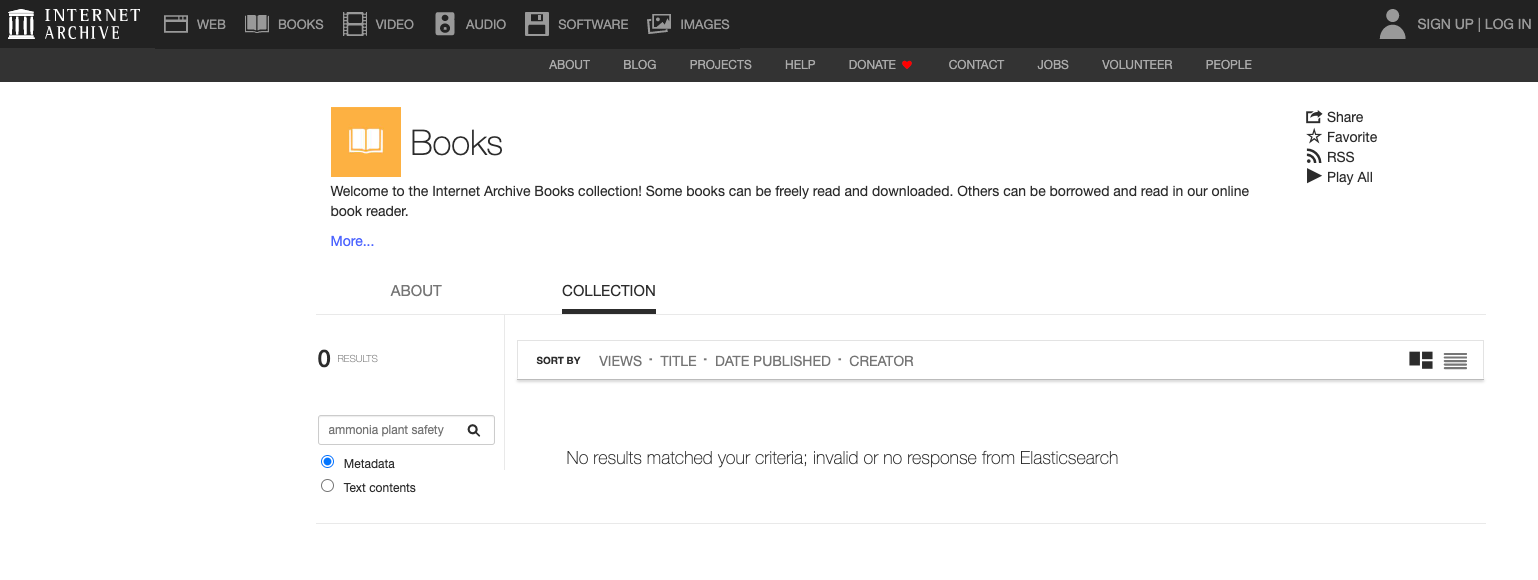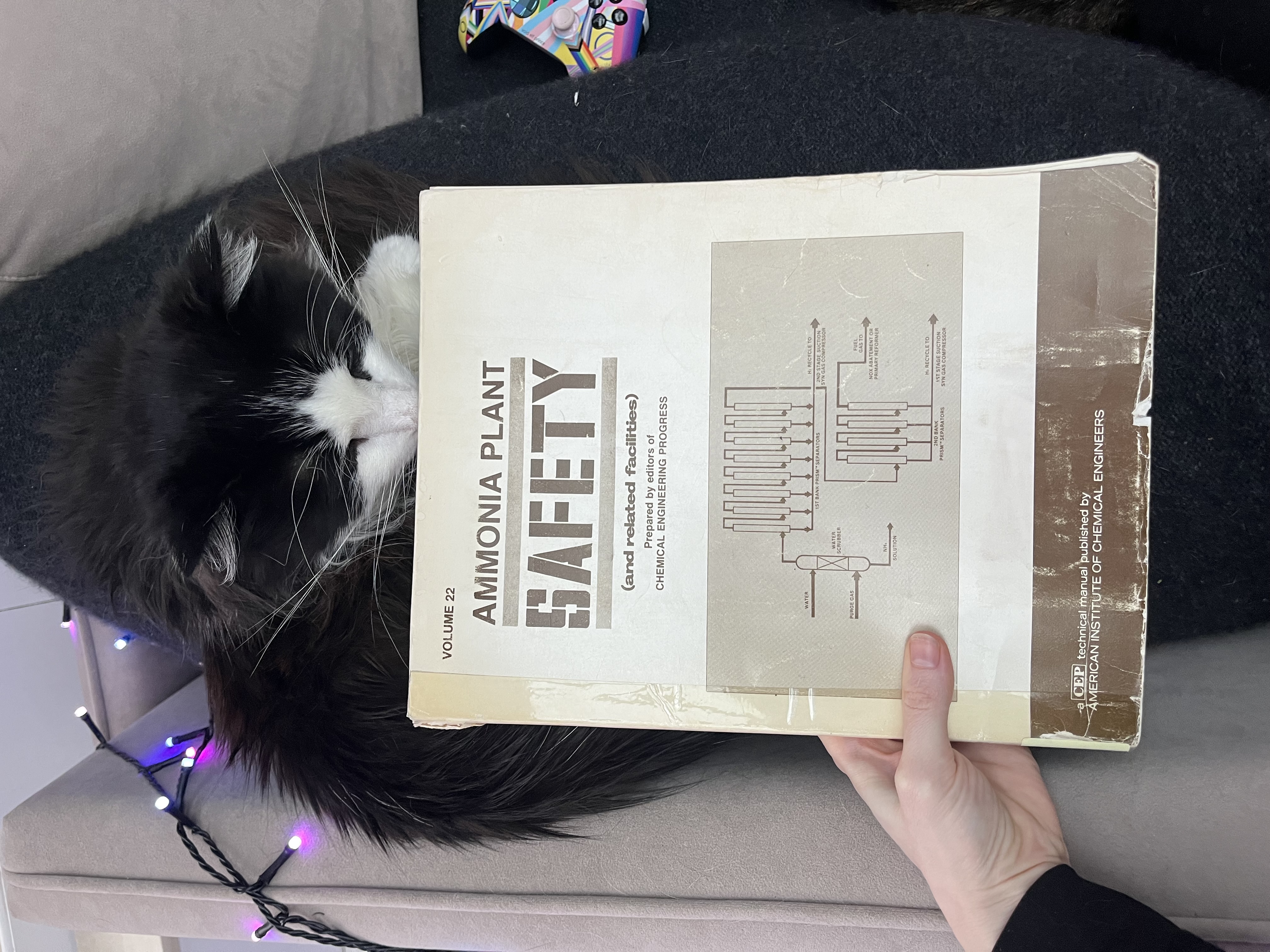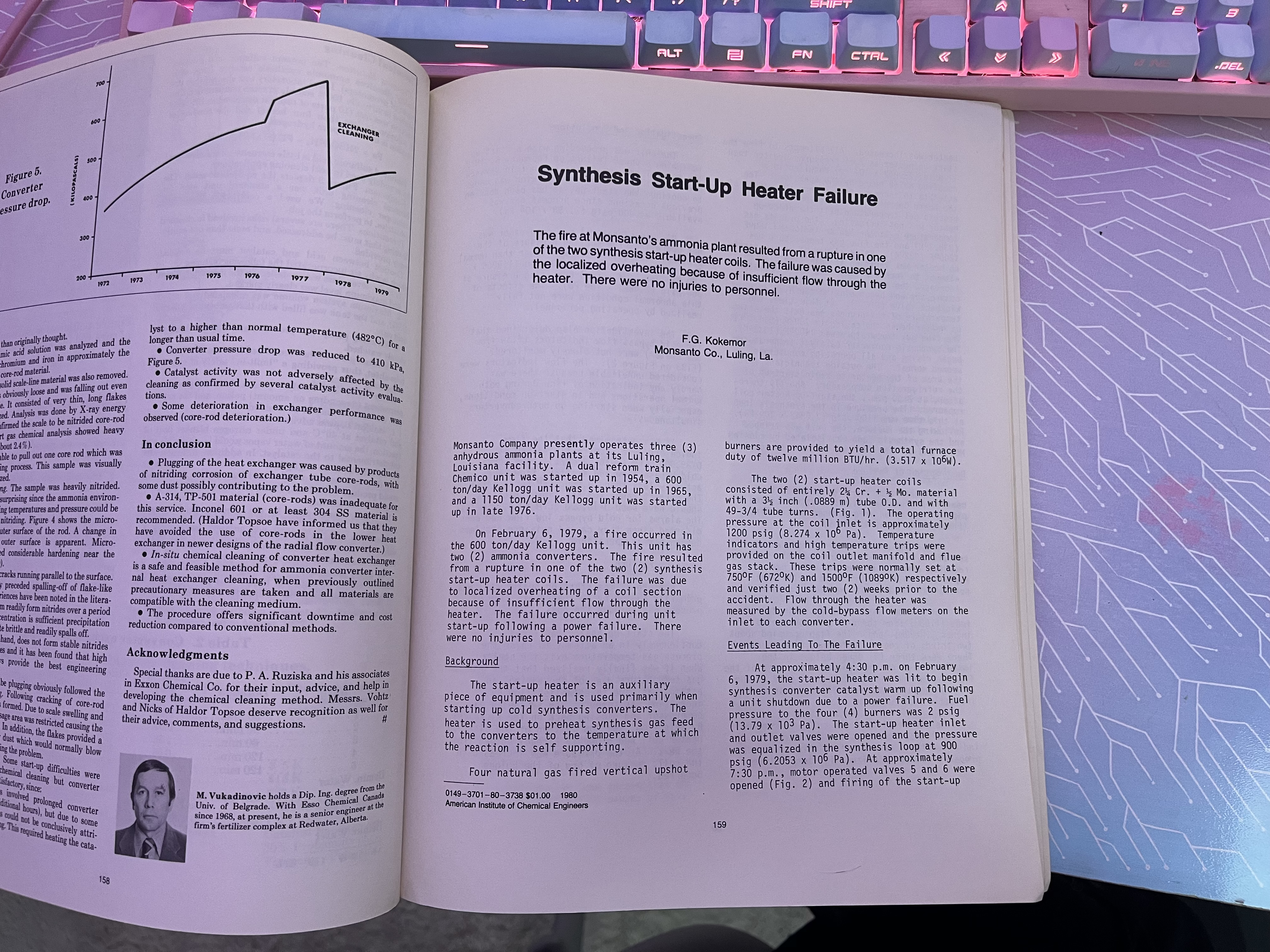When Something Disappears From the Internet
Something I desperately needed disappeared from the internet.
I was working through copy edits for my upcoming book and saw my copy editor’s comment that a link to a source wasn’t working for her. Strange, but okay. I clicked and – it wasn’t working for me, either.
Fine, I thought, I’ll just find the link on the Wayback machine. Nope. Okay, let’s google the link to get the cached version in the little hamburger menu. Nope. What about googling the quote? There were citations of the quote, but not the source document I read. I tried changing where I placed the quotation marks thinking perhaps I had quoted it incorrectly. Nope.
“How hard could an article about an ammonia plant incident from 1979 be to find?” I wondered aloud to my cat. He trilled at me with the blithe optimism of youth.
I moved onto a different branch of action, going back to the source I found my first search that cites the quote. I checked its references for the full citation, pasting it into Google only to find more materials citing the specific quote. Alas, none were the source.
The next obvious move to try was searching for the article title in Google Scholar. Nothing. I tried pasting just the title of the article (“synthesis start-up heater failures”) in quotation marks in Google Scholar – nothing – then Google – also nothing.
I tried without quotation marks – lots of irrelevant results to sift through, none fruitful. I tried with quotation marks in Bing, finding a single, but different, citation of the quote (with a slightly different title, curiously; “heater failure” vs. “heater failures”) but not the source document. I tried it in Baidu, and yet again found only another citation.
I distinctly remember thinking, “Well, fuck.” In vain hope, knowing my frenetic research patterns of devouring sources in rapid succession and, at best, bookmarking them, I checked my Downloads folder for the article. It was not there. I had relied on the purportedly immortal memory of the internet; but memory, like the moon, is a harsh mistress.
I stared indistinctly at my monitor in disbelief for a few moments before venturing down yet a new path: tracking down volume 22 of “Ammonia plant safety (and related facilities)” to see if the article was digitized and just OCR’d poorly – explaining why it might not show up in any search results.
This was more promising. I discovered the name of the organization who publishes it – the American Institute of Chemical Engineers (AIChE) – as well as a used book seller in the UK who appeared to be the only one selling a physical copy of it, but I worried it wouldn’t arrive in time for the extremely tight turnaround for copyediting (or perhaps even for the book going to the printers). And AIChE didn’t seem to have any archives available online.
At this point I was flummoxed. My mental model of reality was showing cracks, as it never occurred to me that something might completely and utterly disappear from the internet. After all, adults admonished us as children that whatever we did on the internet would be a permanent, indelible mark on our lives (or, at least, how others perceived us).
Yet, I am notoriously stubborn and refused to wallow in a deluge of existential panic; “get your shit together, Shortridge,” my brain scolded my brain into a brainstorming. The best course of action, I felt, was calling AIChE to ask if they had a version of volume 22 I could peruse or buy. I am allergic to phone calls but such an arduous quest calls for courage and heroism, so I steeled myself for the endeavor.
Someone quickly answered and asked me if I was fine being put on hold; I acquiesced. But instead of hold music, I received a “this number is not connected” message and listened to the busy signal until the line, and a small morsel of my soul, died.
I called them again. This time, the AIChE representative informed me that they do not keep archives and suggested I call or email the Linda Hall Library instead. Having just subjected myself to a phone call and believing that an email with a generic request was too slow for my now incandescent inquiry, I visited the library’s website to do a catalog search.
I discovered that my precious volume 22 exists! Kind of! It specifically exists in CD-ROM form (three of them total!) for fifty years of proceedings. I was ecstatic – I could check out the CD-ROMs, so there was hope yet! But wait, are they also located in NYC like AIChE? No… Kansas City.
Well, fuck. Alright. I popped an antihistamine and called the Linda Hall Library. They answered with a voice recording indicating that the library was closed due to inclement weather in the Kansas City area; I searched to verify this claim and it was a legitimate excuse. Fine, I sighed, I’ll call tomorrow, which felt forever away in the midst of my epic quest.
In the meantime, a few additional avenues had occurred to me. I searched for the article on the Internet Archive and received the response, “invalid or no response from Elasticsearch.” It, too, was experiencing inclement weather.

But, I mused, maybe the Internet Archive does have it and I’m searching poorly. I searched for “ammonia plant safety” on the main page instead of the Books section and found that the Internet Archive has volumes 23, 24, 27, 28, 30, 35, 36, 37, and 42 – but not 22.
Well, fuck. I stared at my computer for a minute, indulging in a bit of renewed self-pity over this abrupt disruption of my mental model of the internet. Then I decided that fuck it, I want a souvenier of this experience, so I went back to the used bookseller and bought the physical copy anyway, timelines be damned.
After this pyrrhic victory, I finally went back to reviewing copy edits… but the mystery kept itching in my brain so in less than ten minutes I was back to hunting for the evanescent article. I went to the Google Books page for volume 22 for like the tenth time and finally clicked “Find in a library.” This took me to worldcat.org, which displayed a list of libraries and their contents. The New York Public Library, my obvious favorite, only had volumes going back to 1995; I needed 1980. I felt slightly betrayed.
I discovered Stanford’s library not only has volume 22 in their archives but will even scan it to PDF… but only if you’re affiliated with Stanford. I wondered how quickly I could become a visiting scholar or sign up for a PhD. Both, as you might suspect but I still verified just in case, are lengthy processes. Instead, I sent out a plea for help on Mastodon – but no one cared and I can’t blame them.
I looked up other libraries that possess my precious article, wracking my brain for academics I know. Princeton seems to have it, but I don’t know anyone there. The MIT library – where I do know people – lists seven other libraries that they know have it and I know no one in any of those, so… Stony Brook also has it; but I don’t know anyone there and going out to Long Island is Absolutely Certain A Burden (as any New Yorker can attest, ACAB).
At this point I’ve spent at least an hour, if not two, in pursuit of this volume and I realize I have better things to do with my life. I decided to just call the Linda Hall Library again tomorrow and see what they can do.
I called the next morning. The soft-spoken gentleman on the phone was very helpful in tracking down that the Linda Hall Library possesses not just the CD-ROM copy but a physical copy as well and, even better, they can provide a scanned version for a total fee of $49.50. I rejoice. I submitted the request for it with the 6 hour delivery premium option so that, if everything goes to plan, I receive a scanned copy by day’s end.

I received the scanned copy far sooner than day’s end, much to my delight, and nearly wept with joy when I saw the quote in question on the fifth page of the document1. There, at a tilted angle, read:
“If you only depend on well-trained operators, you may fail. I think you really must depend on the design approach and don’t depend much at all on the operation.”
![A screenshot of the quote from the article in question, attributed to “Duskin, ICI.” It reads: “We’ve had two failures, one of which was very similar to yours, and our analysis also was surprisingly similar to yours. I have two comments to make and one question. There are two approaches you can take on this: the design approach and the operational approach. In the design approach you must check out the instrumentation and trip and alarm parameters, and you’ve got to watch the metallurgy as well. The operational approach is the one your paper discusses. Now, what we have been finding is that the best approach to take is really the design one, and I’m sure you’ve gone for the correct approach on flow. I think if you consider only metallurgy, and make sure you put in stainless steel, then no matter that [sic] temperatures you reach, you should be safe. If you depend only on well-trained operators, you may fail. I think you really must depend on the design approach and don’t depend much at all on the operation. You also said you had temperature trips checked two weeks previously, but you didn’t mention them again. Presumably that evidence was destroyed in the fire?”](/blog/img/disappearing-article/duskin-quote.png)
The parallels to software engineering are likely obvious just from reading the quote. There are other quotes in this article – specifically in the discussion section regarding the ammonia plant accident – that are highly pertinent, too, like:
“The point that makes this operation the most dangerous is the fact that the heater is not used daily. You may only use it a couple of times a year, and most of the time it’s just sitting idle, so that you don’t really pay too much attention to it.”
It makes me want to collect an exhaustive list of similar publications from other niche domains that publicize their incident reviews. What else might we glean?
My forthcoming book is, in part, a bold attempt at pattern matching across domains like chemical engineering but also healthcare, air transportation, forestry, ecology, aerospace, urban infrastructure, natural disasters, and other complex systems domains to borrow opportunities to sustain resilience in our complex software systems.
Yet, I know I am only scratching the surface since so much of this knowledge is siloed; what other industry publications with valuable lessons learned might have vanished from the internet as well, or never made it there in the first place?
My physical copy from the UK arrived in under two weeks (but after the completion of the copy edit, as predicted), so I received a second dopamine spike when feeling the volume in my hands and reading the quote directly from its worn, weathered pages. I never thought I would feel such joy from owning a publication about the agonies and ecstasies of ammonia production from many years before I was born, but in another sense, that feels entirely on brand for me.
 )
)

Conclusion
What is the lesson of this tale? Libraries and esoteric bookstores are marvelous and we should fight to preserve them how we can. Also, if you find a source that is quite important to your project, download a local version just in case (or ensure it makes it on the Wayback machine).
It isn’t everyday that something disappears from the internet. But, like any complex system, we must appreciate that surprises are natural and prepare accordingly.
Enjoy this post? You might like my book, Security Chaos Engineering: Sustaining Resilience in Software and Systems (with Aaron Rinehart), available for preorder on Amazon, Bookshop, and other major retailers online.
-
Even the fabulous Linda Hall Library had the article listed as “Synthesis Start-up Heater Failures” (plural), even though, as evident from the physical copy, it’s “Synthesis Start-up Heater Failure” (singular). I find that kind of discrepancy a bit charming in the digital age. ↩︎